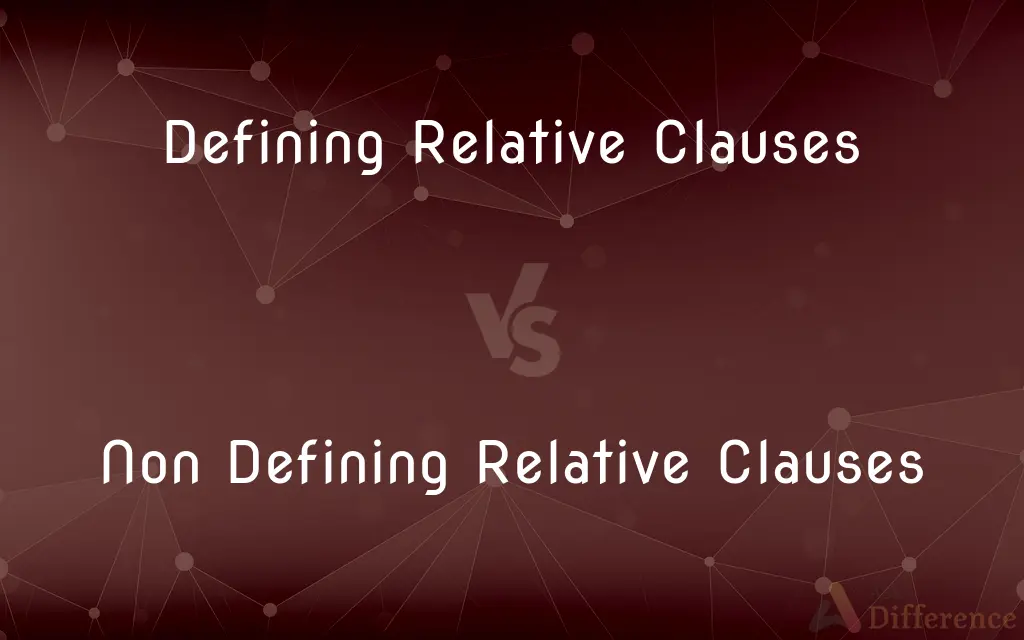Defining Relative Clauses vs. Non Defining Relative Clauses — What's the Difference?
Edited by Tayyaba Rehman — By Fiza Rafique — Published on December 16, 2023
Defining Relative Clauses specify essential information for understanding, while Non Defining Relative Clauses provide additional, non-essential details. Both relate to antecedent nouns.

Difference Between Defining Relative Clauses and Non Defining Relative Clauses
Table of Contents
ADVERTISEMENT
Key Differences
Defining Relative Clauses are integral to the sentence's core meaning. They act as identifiers, narrowing down the specific entity or entities being referenced, ensuring clarity. Without Defining Relative Clauses, the intended meaning of a sentence could be unclear or ambiguous. For instance, "The book that is on the table is mine" uses a Defining Relative Clause to specify which book.
On the other hand, Non Defining Relative Clauses offer extra information that, although informative, is not crucial for grasping the sentence's primary message. They are typically set off by commas, and their removal does not alter the fundamental meaning of the sentence. A sentence like "The Eiffel Tower, which is in Paris, is famous" employs a Non Defining Relative Clause to add a detail about the Eiffel Tower.
Interestingly, while both Defining Relative Clauses and Non Defining Relative Clauses relate to an antecedent noun in the sentence, they differ in their punctuation and essentiality. The presence or absence of commas can often hint at the type of clause being used, with commas generally indicating a Non Defining Relative Clause.
Both Defining and Non Defining Relative Clauses utilize relative pronouns such as "who," "which," and "that." However, "that" is typically reserved for Defining Relative Clauses in American English. In essence, while both clauses add depth to sentences, Defining Relative Clauses are indispensable for comprehension, whereas Non Defining Relative Clauses enrich with optional insights.
Comparison Chart
Essentiality
Essential for understanding
Non-essential, additional detail
ADVERTISEMENT
Punctuation
No commas
Commas set off the clause
Alteration Impact
Changes sentence meaning
Sentence retains core meaning
Use of "that"
Commonly used
Rarely used
Example
"People who work hard succeed."
"Mr. Smith, who works hard, succeeds."
Compare with Definitions
Defining Relative Clauses
Clauses without which a sentence becomes ambiguous.
The shirt that I bought is blue.
Non Defining Relative Clauses
Additional details about a noun, set off by commas.
Paris, which is in France, is beautiful.
Defining Relative Clauses
Essential parts of sentences clarifying the specific noun.
Cars that run on electricity are eco-friendly.
Non Defining Relative Clauses
Clauses providing extra, non-essential information.
My brother, who is a chef, loves Italian cuisine.
Defining Relative Clauses
Integral modifiers providing necessary details about nouns.
The movie that won the award was controversial.
Non Defining Relative Clauses
Optional insights enriching a sentence without altering its primary meaning.
The book, which was a bestseller, is thrilling.
Defining Relative Clauses
Clauses vital for understanding the noun they modify.
The girl who wears glasses is my sister.
Non Defining Relative Clauses
Supplementary information about a specific noun.
The dog, which barks loudly, is friendly.
Defining Relative Clauses
Indispensable information about a preceding noun.
Animals that are endangered need protection.
Non Defining Relative Clauses
Informative clauses that can be omitted without confusion.
The painting, which is abstract, is colorful.
Common Curiosities
Can I omit a Defining Relative Clause without changing the sentence's meaning?
No, omitting a Defining Relative Clause can make the sentence ambiguous or unclear.
What are Defining Relative Clauses?
Defining Relative Clauses provide essential information to identify the noun they modify.
How are Non Defining Relative Clauses different?
Non Defining Relative Clauses give additional, non-essential information about a noun, typically set off by commas.
Can I use "that" in Non Defining Relative Clauses?
In American English, "that" is typically reserved for Defining Relative Clauses.
Are Non Defining Relative Clauses always surrounded by commas?
In most cases, yes. They're set off by commas to indicate their supplementary nature.
Is "The man who sold me the car" a Defining Relative Clause?
Yes, it specifies which man, making it a Defining Relative Clause.
Can Defining Relative Clauses appear at the end of sentences?
Yes, they can appear anywhere in a sentence, depending on what they're defining.
Can I rewrite a sentence to change a Defining clause to a Non Defining one?
Yes, but the core meaning and structure of the sentence may need adjustment.
Are Non Defining Relative Clauses always in the middle of sentences?
Not always. They can appear in the middle, start, or end, depending on the noun they're modifying.
Why use Non Defining Relative Clauses?
They enrich sentences by adding interesting, though not essential, details.
Do all sentences require Defining or Non Defining Relative Clauses?
No, their use depends on the level of detail or clarity the writer wishes to convey.
Can Non Defining Relative Clauses start with "who" or "which"?
Yes, both "who" and "which" can introduce Non Defining Relative Clauses.
Do Defining Relative Clauses have commas?
Generally, no. They don't use commas as they're integral to the sentence's meaning.
Are Defining Relative Clauses mandatory in sentences?
If the sentence requires specification for clarity, then yes, they are necessary.
What's the key difference in punctuation between the two?
Defining Relative Clauses don't use commas, while Non Defining ones are set off by them.
Share Your Discovery

Previous Comparison
Micro Economics vs. Macro Economics
Next Comparison
Quick Breads vs. Yeast BreadsAuthor Spotlight
Written by
Fiza RafiqueFiza Rafique is a skilled content writer at AskDifference.com, where she meticulously refines and enhances written pieces. Drawing from her vast editorial expertise, Fiza ensures clarity, accuracy, and precision in every article. Passionate about language, she continually seeks to elevate the quality of content for readers worldwide.
Edited by
Tayyaba RehmanTayyaba Rehman is a distinguished writer, currently serving as a primary contributor to askdifference.com. As a researcher in semantics and etymology, Tayyaba's passion for the complexity of languages and their distinctions has found a perfect home on the platform. Tayyaba delves into the intricacies of language, distinguishing between commonly confused words and phrases, thereby providing clarity for readers worldwide.
















































